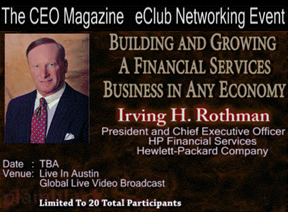You are here
- Todd Williams |
- Leadership - Management |
- Fri, 11/15/2013 - 14:16

Todd C. Williams, Founder & President, eCameron, Inc.
Turning vision into profitability takes equal parts of leadership and management. Understanding which parts to use is the challenge. As leaders we set the vision and define the corporate culture. If we do not imbue the qualities that build trust within our company and with our customers, growth will be elusive. Nowhere is this more evident than when your company’s capabilities need to change and you start a corporate wide initiative. In these projects everyone must be aligned, communication and process is critical, yet you need to be innovative and push the envelope.
Nearly 30 years of dealing with companies large and small have given me a few lessons on the balance we must achieve in reaching for that new goal.
Managing Process and Attaining Compliance
Management is the easier task. We direct and we remain accountable. However, it limits our company’s (not to mention our own) growth. Management is about applying processes, attaining compliance, and measuring performance against goals.
Hiring Expertise. Bringing in a person to fill a void is wrong. It is better to do without than to endorse mediocrity. Always hire the right people.
Applying Process. Process compliance is at the core of management. Properly applying process provides our customers with consistency, never bureaucracy. Process stifles creativity. This is a good thing, look what innovative accounting did for us.
When People And Process Go Awry
The cry “We have always done it that way” indicates two problems—one with a process another with a person.
Caution with Technology. Technology provides consistency and efficiency. Never apply without first having the proper people and processes in place; otherwise, technology will screw things up quicker and far more efficiently.
Managing the Goal. Define and manage scope, document decisions, and give the users what they need—question what they want.
Minding the Constraints. Scope, schedule, and budget, pick two and only two. The project manager will tell you the third. Trying to edict all three is the definition of a failure waiting to happen.
Learning to Compromise. You will never reach perfection. You and your customer are going to have to compromise. It is incumbent upon you to train your employees in the science and art of negotiation.
Building Innovative Cultures
To excel in business we have to be innovative. Projects, by definition (a temporary endeavor to create a unique project or service) have to be innovative. This requires building a culture around leadership and self-direction.
Maintaining Objectivity. Too many project managers are overly passionate about their projects. Rather than rooting for their project like high-school cheerleaders, they need to maintain objectivity. They must be passionately dispassionate and determine what to amplify and what to discard.
Fostering Teams. Teams find answers. Learn from them. Talk to them. Work with them. Sponsor and support them. Communicate with them. However, never do the work for them. Leaders let others lead and support them when they stumble. Let them make mistakes so they can learn and grow. Management means you know how; leadership means they know how.
Forgetting Blame. A culture of blame is the fastest way to destroy morale, teamwork, and trust. It is an infectious disease that creates finger pointing and secrets. Do not search for blame. Once you have found it will only give you fleeting pleasure, there is still a problem to fix.
Culture Counts
No blame, no shame—build trusting teams of self-directed people who take pride in their work
Heeding Denial. Before any problem can be addressed, you have to first admit it exists. An open culture devoid of blame, asking for help and open to learning will avoid nearly every catastrophic failure. It is an integral part of any innovative culture.
Focusing on Data. Relying on data and avoiding analysis paralysis is the foundation of good decisions. Numbers are truthful little bastards, squeeze them hard enough and they will tell you the truth. They cannot lie; it is integral to their job.
Turning Visions into Profits
New strategies mean new business capabilities which beget projects. That is how your company grows and survives. Your time to market relies on your company’s ability to run projects efficiently and deliver results in the shortest possible time allowing you to achieve your desired ROI. These eleven traits help build a lean culture focused on speed of implementation. They will continue to be your focus; the challenge being establishing them throughout your organization. As the leader you must continually adjust and apply the right mixture of innovation and process. The right balancing of leadership and management will grow your people, your company, and your profits.
About the Author
 Todd C. Williams is the founder and president of eCameron, Inc. (www.ecaminc.com), they help companies make their vision profitable. He has over 25 years of experience in recovering failing projects, preventing their failure, and applying those lessons to help other organizations fulfill their strategic goals. He has helped his clients through strategic planning facilitation, setting up and running operations, IT leadership, and as an expert witness. He is the author of Rescue the Problem Project: A Complete Guide to Identifying, Preventing, and Recovering from Project Failure and can be found on LinkedIn (linkedin.com/in/backfromred/), Twitter (twitter.com/backfromred), Facebook (facebook.com/BackFromRed), by phone: +1 (360) 834-7361, or email: todd.williams@ecaminc.com.
Todd C. Williams is the founder and president of eCameron, Inc. (www.ecaminc.com), they help companies make their vision profitable. He has over 25 years of experience in recovering failing projects, preventing their failure, and applying those lessons to help other organizations fulfill their strategic goals. He has helped his clients through strategic planning facilitation, setting up and running operations, IT leadership, and as an expert witness. He is the author of Rescue the Problem Project: A Complete Guide to Identifying, Preventing, and Recovering from Project Failure and can be found on LinkedIn (linkedin.com/in/backfromred/), Twitter (twitter.com/backfromred), Facebook (facebook.com/BackFromRed), by phone: +1 (360) 834-7361, or email: todd.williams@ecaminc.com.
Comments
Follow The Blog
Blog Categories
- Business Ops. (45)
- Editors (3)
- Entrepreneurship (196)
- Finance (25)
- Leadership (529)
Blog Authors
- Guest Blogger (835)
- Cynthia Kay (92)
- Linda Henman (78)
- Dianna Booher (46)
- Craig Ross (31)

















